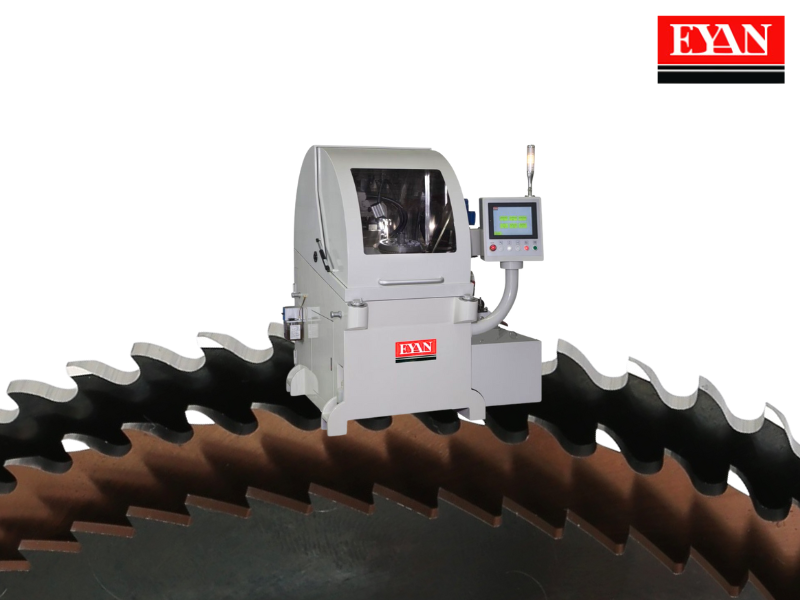The Superiority of HSS Saw Blades and Eyan Machine Tools' Sharpening Solutions

Introduction:
In the world of cutting tools, the material of the saw blade plays a crucial role in determining its efficiency, durability, and suitability for specific tasks. High-Speed Steel (HSS) saw blades are particularly esteemed for their performance in challenging environments. Eyan Machine Tools Co., Ltd., with its esteemed S and EMA series, offers premier sharpening machines capable of maintaining these high-performance blades.
Applications of HSS Saw Blades:
HSS saw blades are extensively used in industries that require precise and efficient cutting of tough materials. These applications include but are not limited to:
- Metalworking:
- Ferrous Metals: HSS blades are particularly effective for cutting ferrous metals such as steel and iron. Their high-speed capability allows them to handle the toughness of these materials while maintaining a clean cut, which is essential for fabrication and assembly processes.
- Non-Ferrous Metals: These include materials like aluminum, copper, and brass. HSS saw blades cut through these softer metals quickly and with precision, making them ideal for industries such as electrical component manufacturing and plumbing fixtures.
- Pipe Cutting:
- Tube Manufacturers: For manufacturers who specialize in producing metal tubing, HSS blades are indispensable. They provide clean and precise cuts necessary for ensuring the tubes fit perfectly in construction or piping systems.
- Custom Fabrication: In custom fabrication, where tubes of varying thicknesses and materials need to be cut to exact lengths, HSS blades’ precision is crucial. This ensures that each piece meets strict industry standards and tolerances.
- Manufacturing:
- Automotive Industry: In the automotive sector, HSS blades are used to cut through metal parts like exhaust systems and frame components. Their ability to maintain sharpness under intense use reduces downtime for blade changes, streamlining production lines.
- Aerospace Industry: The aerospace industry relies on HSS blades for the precision cutting of components that require exact dimensions and cannot tolerate errors, such as in the fabrication of engine parts and structural elements.
- Consumer Goods Manufacturing: HSS blades are also used in the production of durable goods, such as appliances and furniture, where components often need to be cut from metal sheets.
- Specialty Applications:
- Jewelry and Craftsmanship: Smaller HSS blades are used in crafting and jewelry making, where precision cuts in small or delicate metal components are required.
- Robotics and Prototyping: In robotics and prototyping, where materials vary widely and precision is paramount, HSS blades provide the necessary versatility and accuracy.
Characteristics of HSS Saw Blades:
The popularity of HSS saw blades stems from several distinct characteristics:
- Durability: HSS is a tough material that resists wear and tear, making it suitable for cutting hard materials.
- Heat Resistance: HSS blades can withstand high temperatures without losing their temper, allowing for faster cutting speeds.
- Versatility: They can be used to cut a variety of materials effectively.
Comparison with Other Saw Blade Materials:
HSS saw blades often compete with other materials like Carbide, Carbon Steel, and Diamond-Tipped blades. Here’s how they compare:
Carbide Blades:
- Advantages: Carbide-tipped blades are known for their exceptional hardness and wear resistance, allowing them to maintain a sharp edge longer under continuous use. They excel in high-volume production environments where minimal downtime is crucial.
- Disadvantages: Despite their hardness, carbide blades are more brittle and susceptible to chipping, especially when used on irregular or non-standard materials. They are also generally more expensive and require more care during handling and use.
- HSS Comparison: HSS is more flexible than carbide, making it less likely to chip or shatter under high stress or when encountering unexpected material inconsistencies. This shock resistance makes HSS blades more suitable for varied job site conditions and less predictable materials.
Carbon Steel Blades:
- Advantages: Carbon steel blades are very cost-effective, making them a popular choice for soft materials and low-budget projects. They are easy to sharpen and are widely available in various configurations.
- Disadvantages: The major drawback is their lower wear resistance; they dull more quickly when used on harder materials, leading to more frequent blade changes and higher long-term costs in demanding environments.
- HSS Comparison: HSS offers a superior balance between hardness and resistance to wear. It retains sharpness longer than carbon steel when cutting harder or abrasive materials, reducing the frequency of blade replacements and maintenance costs.
Diamond-Tipped Blades:
- Advantages: Diamond-tipped blades are the best choice for cutting the hardest materials, including stone, concrete, and ceramic tiles. Their cutting edges are embedded with diamond particles, which provide unparalleled hardness and cutting capacity.
- Disadvantages: The specialized nature of diamond blades makes them significantly more expensive. They are also overqualified for cutting softer or less abrasive materials, where cheaper blades would suffice.
- HSS Comparison: While not as hard as diamond, HSS is more than adequate for most metal cutting applications, offering a cost-effective balance of durability and performance. It's also more versatile, capable of cutting a wider range of materials without the risk of overuse damage that diamond blades might face in less suitable tasks.
Eyan Machine Tools' Sharpening Solutions:
To maximize the performance and lifespan of HSS saw blades, regular sharpening is essential. Eyan Machine Tools’ S and EMA series sharpeners are specifically designed to handle the robustness of HSS blades. These machines not only restore sharpness but also adjust to the specific grinding requirements of HSS material, ensuring that the blades are ground without compromising their structural integrity.
Conclusion:
For steel mills, tube manufacturers, and various industrial sectors, HSS saw blades represent a balanced choice for efficiency and longevity. Eyan Machine Tools complements this excellence by providing state-of-the-art sharpeners in the S and EMA series, designed to keep your HSS blades in peak condition. Investing in the right sharpener is as crucial as selecting the right blade, and with Eyan, you ensure both.
